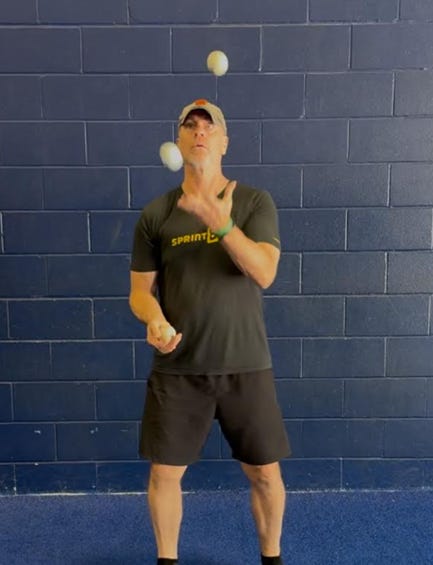TPM #318: Juggling Is 1 Skill That All Can Benefit From.
This super skill is fun, helps with spatial awareness, improves confidence, mood and reduces stress. It is practiced by the best athletes in the world yet few share it with young people.
In this day of people searching for super pill or super fix for whatever ails us, we have 1 skill that is a great foundational piece for development right under our nose that checks a lot of boxes.
Improves mood
Reduces stress
Improves spatial awareness
Improves confidence
Betters problem solving skills
Improves concentration and brain activity
Enhances hand-eye coordination
Helps with goal-setting skills
Fosters delayed gratification
Improves reaction-time and reflexes
Improves balance
Helps with stress reduction
Improves oxygen intake
Teaches patience and persistence.
Helps with resilience and determination
Helps with learning to learn
Pretty good list of benefits eh?
In fact, now that I read this, I think I will take up juggling again. These benefits are not just for kids.
As it pertains to all these skills and sports performance, obviously there is a strong correlation. I say “obviously” because many of the above are foundational to sport skill development.
And before anyone says that it does not carry over to your sport, please revisit the list of benefits.
Hand-eye coordination?
Balance and coordination?
Reaction time and spatial awareness?
Fun and confidence?
Focus ?
Name me a sport where an athlete could not benefit from the development of these abilities?
The Best In The World
Carlos Alcaraz is one of the best tennis players in the world. His warm up routine draws attention as it is a little different than most.
He juggles to prepare his body and mind for competition and because it is fun. He is known as a player who is at his best when playing with joy.
Alcaraz is not the only athlete who does this, you will see hockey goalies juggle to help with tracking, and you may have heard of Steph Curry from the basketball world?
Noah Cowan, a professor of mechanical engineering at Johns Hopkins University has researched juggling. “It just provides that rapid opportunity to calibrate your sensory motor systems so that they can then be brought up to the sort of level that they were,” he is quoted as saying in the article on Alcaraz.
The skill requires a level of focus that pushes out distractions. There may be other exercises that offer the same benefits. However, few are as portable.
“I’m just completely in the moment and in flow and only able to do that one thing,” Cowan said. “And I think that’s an incredibly useful thing. There are a lot of things you can do that with, but there’s few that can be carried in your backpack and be done at any point in any space.”
For coaches, this means you can incorporate this into warmups and practice in just about any setting.
All that is needed is a quick lesson on how to get started, a few tennis balls and the opportunity to practice.
Hockey players can often be found playing 1 touch with a soccer ball as part of warmup. This is a juggling variation with many of the benefits listed above. Baseball and tennis players have tons of balls lying around in every practice. It is not that hard to incorporate into in season warmups and off-season skill development for any sport.
Juggling is the 1 skill that we can all benefit from…and especially relevant for young athletes in development stages.
Deeper dive:
Here is how 1 strength coach uses juggling during workouts and some quick videos on how to teach juggling.
https://simplifaster.com/articles/juggling-skill-athlete-benefits/
The neuroscience of juggling:






